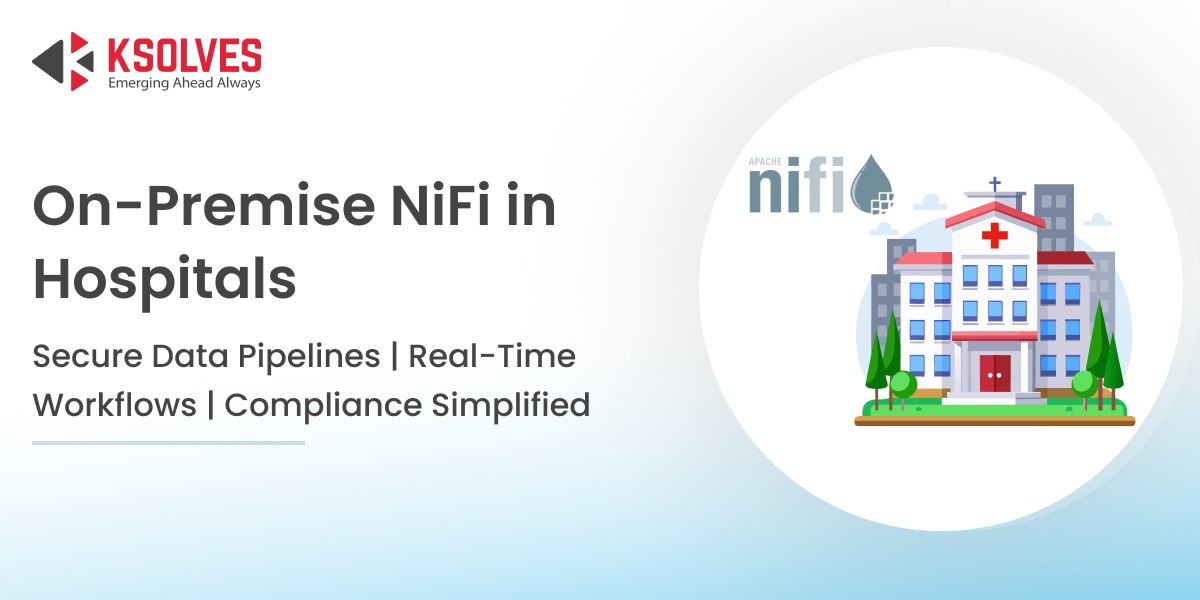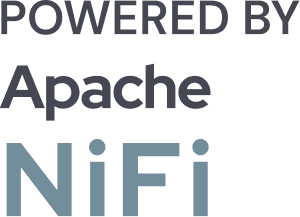How Hospitals Use On-Premise NiFi for Secure, Compliant Data Pipelines
![]()

Healthcare today runs on data. From patient records and diagnostic images to appointment schedules and lab reports, data is at the heart of every clinical decision, patient interaction, and administrative task. But with this reliance comes risk: data breaches, compliance violations, and costly delays caused by inefficient data systems.
In response, forward-looking hospitals are moving toward on-premise data strategies that give them greater control, tighter security, and better compliance. Apache NiFi, an open-source data integration tool, is rapidly becoming the backbone of these on-premise pipelines. But NiFi’s manual deployment processes can slow things down, until now.
This blog walks you through how hospitals can use on-premise NiFi for secure data pipelines and how Data Flow Manager accelerates flow deployment, eliminates manual overhead, and simplifies flow management at scale.
Why Secure Data Pipelines Are Mission-Critical in Healthcare
Hospitals handle some of the most sensitive and high-value data imaginable:
- Personally Identifiable Information (PII)
- Protected Health Information (PHI)
- Diagnostic Imaging and Lab Results
- Insurance, Billing, and Financial Records
The stakes couldn’t be higher. A single data breach can lead to multi-million-dollar fines, legal liabilities, operational disruption, and lasting damage to a hospital’s reputation.
To mitigate these risks, healthcare organizations must navigate a complex landscape of regulatory frameworks, including HIPAA, GDPR, and local health data protection laws. These regulations demand uncompromising control over how data is stored, accessed, and processed.
Hospitals must ensure the ability to:
- Track data lineage across every system and touchpoint.
- Enforce access controls down to the user and data level.
- Encrypt sensitive data both in transit and at rest.
- Maintain full audit trails to demonstrate regulatory compliance.
On-premise Apache NiFi empowers hospitals to meet these exact requirements, offering the flexibility to design, secure, and monitor data flows entirely within their own infrastructure, without external exposure or third-party dependency.
Why On-Premise Apache NiFi is an Ideal Choice for Healthcare
Apache NiFi is a robust, open-source platform designed to move, transform, and manage data across complex ecosystems. In a hospital environment, this means enabling real-time data flow between a wide range of systems, including Electronic Health Records (EHRs), laboratory instruments, IoT-enabled medical devices, CRM platforms, and analytics dashboards.
With its intuitive, drag-and-drop interface, NiFi empowers IT teams to design, monitor, and manage data pipelines that support both structured and unstructured data, without writing extensive code.
For healthcare providers, deploying NiFi on-premise unlocks three strategic advantages:
1. Complete Data Ownership and Visibility
Every data stream, whether from EHRs, imaging devices, lab systems, or insurance exchanges, stays within your hospital’s perimeter. There is no dependency on external servers or storage, which means IT teams can closely monitor and audit every transaction, from source to destination.
2. No Vendor Lock-Ins or Platform Constraints
With cloud platforms, data architecture is often dictated by the provider’s framework. On-premise NiFi gives hospitals the freedom to shape and evolve their data flows exactly as needed, supporting hybrid systems, custom APIs, and proprietary protocols without compromise. You’re not locked into a single vendor’s upgrade cycles or pricing structures.
3. Streamlined Compliance and Audit Readiness
Regulations like HIPAA, HITECH, and GDPR require full control over where and how data is stored, processed, and accessed. On-premise NiFi ensures that data never leaves the hospital’s network, making it significantly easier to enforce access controls, retain audit logs, and demonstrate regulatory compliance during inspections or legal reviews.
4. Seamless Interoperability with Hospital Systems
Most hospitals operate within a complex IT landscape made up of legacy systems, departmental applications, and modern solutions. On-premise NiFi integrates smoothly with EHR systems, HIS, LIS, RIS, PACS, and various medical equipment interfaces, supporting HL7, FHIR, DICOM, and custom data formats. This interoperability ensures data flows are not just fast, but clinically meaningful.
5. Resilience and Operational Continuity
In a hospital setting, downtime isn’t just inconvenient—it can be life-threatening. On-premise NiFi offers low-latency processing and operational resilience, even when internet connectivity is disrupted. This local-first architecture supports high availability and disaster recovery plans tailored to clinical priorities.
In short, on-premise NiFi gives hospitals the power to take control of their data securely, flexibly, and in real time.
The Hidden Pitfalls of Cloud-Based Data Pipelines and Vendor Lock-In
Many modern data pipeline solutions rely heavily on cloud infrastructure, often accompanied by steep licensing fees, limited customization, and the risk of becoming locked into a single vendor’s ecosystem. For hospitals, these factors can create significant concerns:
- Loss of Data Sovereignty: Sensitive patient information and critical healthcare data must often pass through external servers, raising compliance and privacy issues.
- Escalating Costs: Cloud pricing models that charge based on data volume or usage can quickly become prohibitively expensive as data scales.
- Latency and Reliability Concerns: Mission-critical healthcare workflows require real-time responsiveness, which can be compromised by network delays or cloud outages.
While on-premise NiFi liberates hospitals from these dependencies, offering full control over data and infrastructure, it introduces its own challenge: manual flow deployment that can slow down operations and increase complexity.
Use Cases: How Hospitals Are Using On-Premise NiFi Today
Across the healthcare landscape, hospitals are increasingly turning to on-premise Apache NiFi as the backbone of their data operations. Its ability to unify, automate, and secure complex data workflows makes it an indispensable part of modern hospital IT infrastructure.
Here’s how hospitals are using NiFi to transform day-to-day operations:
1. EHR System Integration
Hospitals often rely on multiple EHR platforms due to mergers, departmental silos, or specialized care units. On-premise NiFi enables seamless integration between these disparate systems by automating the flow of patient data across platforms. This reduces manual data entry, eliminates duplication, and ensures that clinicians have accurate, real-time patient records, regardless of the source system.
2. Real-Time Medical Device Data Ingestion
In critical care units, devices like ICU monitors, ventilators, and infusion pumps generate continuous streams of vital data. NiFi captures this telemetry in real-time, processes it locally, and delivers it to central monitoring dashboards or analytics systems. This empowers medical staff to respond swiftly to changes in a patient’s condition, improving outcomes and operational awareness.
3. Automated Laboratory and Pharmacy Workflows
From blood tests and imaging reports to prescriptions and drug dispensing logs, healthcare workflows are data-intensive. NiFi automates the capture and routing of this information to the right systems and stakeholders, be it a physician’s dashboard, the patient portal, or the billing department. This not only improves turnaround times but also reduces human errors and enhances coordination between departments.
4. Health Information Exchange (HIE) Enablement
Sharing patient data with external entities, such as insurance providers, government agencies, or research organizations, requires strict data governance. NiFi enables hospitals to securely exchange health information while adhering to consent policies, data masking rules, and compliance standards like HL7 and FHIR. Whether it’s public health reporting or collaborative research, data sharing becomes seamless and secure.
The Flow Deployment Challenge – and How Data Flow Manager Solves it
While on-premise Apache NiFi offers unmatched control and security for hospital data pipelines, managing and deploying these flows, especially across multiple environments like development, staging, and production, can be a complex and error-prone process.
In most hospital IT environments, deployment of NiFi flows remains largely manual. Engineers spend countless hours exporting templates, configuring controller services, and replicating changes via the NiFi UI.
This slows down delivery cycles and increases the risk of inconsistencies between environments. Moreover, without a standardized deployment process, rollbacks, compliance audits, and version tracking become difficult and time-consuming, posing risks to both patient data integrity and operational continuity.
This is where Data Flow Manager (DFM) steps in as a game-changer.
Data Flow Manager is a purpose-built tool designed for on-premise setups to deploy and promote NiFi flows across clusters in minutes. Whether your team is moving NiFi flows from Dev to QA or QA to Production, Data Flow Manager makes the process seamless.
With Data Flow Manager, hospital DevOps and data engineering teams can:
- Deploy and promote NiFi flows across environments in just a few minutes, eliminating the need for hours of manual effort.
- Bypass the NiFi UI and remove the repetitive, error-prone tasks of configuring controller services manually.
- Maintain full traceability, with audit logs and version history that support compliance, security policies, and rollback strategies.
For hospitals already invested in on-premise NiFi, Data Flow Manager acts as an intelligent, secure flow deployment layer that enhances flow delivery, minimizes human error, and significantly improves operational efficiency.
Conclusion
In a world where healthcare data is growing exponentially and compliance requirements are tightening, on-premise Apache NiFi offers hospitals a secure, scalable, and fully controllable data pipeline solution. It ensures that sensitive data never leaves the hospital’s ecosystem while enabling seamless integration across clinical and administrative systems.
With tools like Data Flow Manager, the once cumbersome task of deploying NiFi flows is now streamlined, allowing hospital IT teams to focus more on innovation and less on manual maintenance.
![]()

